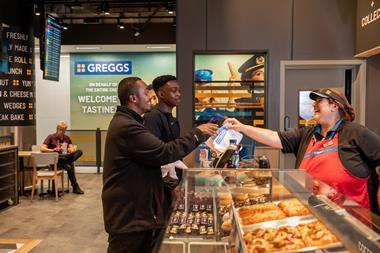Suppliers have told the GCA of being ‘ghosted’ over CPI requests
It’s nine months since Groceries Code Adjudicator Mark White published a set of “golden rules” for retailers, amid what he described as an unprecedented wave of cost price increase requests from suppliers.
But as supermarkets – who all signed up to the voluntary measures – brace themselves for an expected fresh surge of inflationary demands, a new report makes clear not everyone is playing by those rules.
This week White published horror stories of how suppliers say they have been treated, as a follow-up to his June YouGov survey, which showed relations rapidly deteriorating after years of steady progress.
So is it time for the Adjudicator to police the battleground of CPIs?
White’s report, based on in-depth interviews with 20 suppliers, claims the “perfect storm” of economic and political events has caused a breakdown in relations not seen since the Tesco scandal of 2014.
With some suppliers preparing to mount their fifth CPI request in a tumultuous year, companies claimed they were being hit with an array of old-school “delay tactics”, particularly from the big five mults.
This week the GCA conference heard claims suppliers were being ‘ghosted’ and made to wait weeks for responses from supermarket buyers, who the Adjudicator said were spending too much time hiding behind their desks.
White accused “inexperienced and under-trained” buyers of failing to develop personal relationships with suppliers and instead hitting them with “unreasonable” demands, which were contributing to inaccurate forecasts, food waste and shortages on the shelves.
John Noble, director of the British Brands Group, suggests the time has come for GSCOP to be amended to give the GCA powers to police CPI requests.
“We are seeing retailers refusing to discuss increases, blaming suppliers for the rises, ghosting them or drawing out negotiations interminably,” he says.
“Such behaviour is exactly what the code was designed to prevent.
“There is the potential for the Adjudicator to recommend amendments to the code and, for the first time, I wonder [if] now is the time for that.”

Australian system
Noble is among a growing number calling for measures similar to those in Australia, where since 2021 buyers have been expected to accept, decline or negotiate a resolution to a CPI request within 30 days.
David Sables, CEO of Sentinel Consultants, has been arguing for months that GSCOP needs to follow the Australian example, or see the destructive cycles of CPI requests continue to grind down relationships.
“A buyer will always have 20 different ways to justify a delist,” he says. “That’s not the fault of the Adjudicator, it’s a problem with the code.”
Michael Bell, executive director of the Northern Ireland Food & Drink Association, says the UK’s food security is at risk unless GSCOP is urgently “expanded and re-enforced”.
“We have to realise we are not living in normal times,” he says. “With energy price contracts doubling or trebling, raw materials simply unavailable and massive increases in packaging costs, we cannot allow standard [retailer] tactics to continue – that’s crystal clear.”
It’s not so clear what an amendment to the code would look like and even less so whether the government has the stomach for it, especially as it comes amid a BEIS review considering folding GSCOP itself into the CMA.
Ged Futter, CEO of The Retail Mind, believes talk of an amendment to the code is unrealistic, especially under a Liz Truss government.
“The fact is that the GSCOP hasn’t been amended since it came to force and I think the chances of that happening are slim to non-existent.”
Instead, Futter argues, it is down to Adjudicator White to prove he means business when he says retailer behaviour over CPIs will be taken into account in delisting probes, despite GSCOP itself not having a say over prices.
Supermarkets, too, he argues, need to take action as a result of the report’s strong criticism if they are to avoid more empty shelves in the new CPI storm on the horizon.




















No comments yet